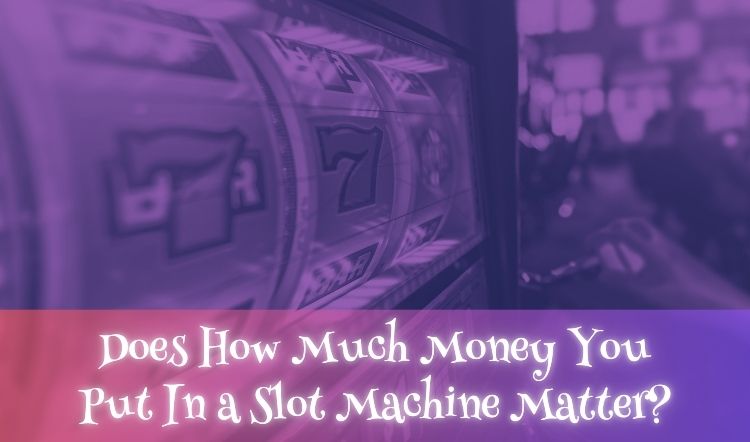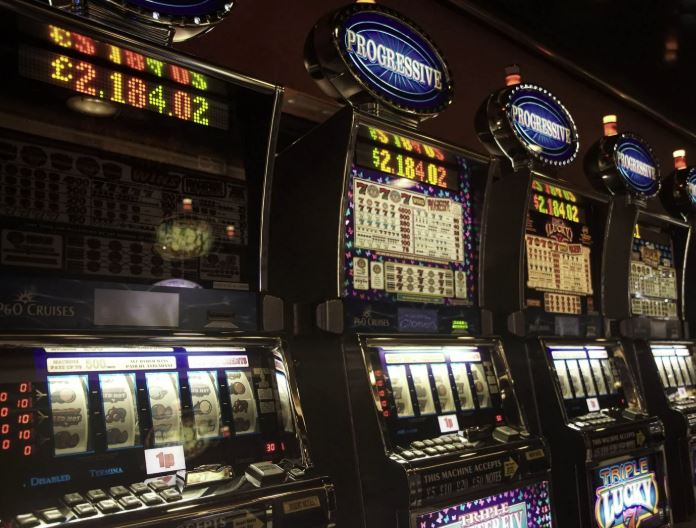
Slot machines are one of the most popular ways to gamble, both in high street bookmakers and at online casinos. They’re known for being simple to play, which often makes them a first choice for new players. However, it’s not uncommon to wonder how they actually work.
This blog will explain whether the amount of money you insert into a slot machine affects your chances of winning. It will also cover how outcomes are decided, how slot machines are designed to pay out, and what terms like “RTP” and “progressive jackpot” really mean. If you’ve never used a slot machine before, this guide can help you understand the basics before spending any money.
Do Slot Machines Know How Much Money You Put In?
Yes, slot machines can track how much you’ve deposited, but not in the way some people might think.
Modern machines — both physical ones found in shops and digital ones used online — record balances and bets using electronic systems. This helps them keep a record of what’s been paid in and how much has been bet. It also allows them to display your current credit and handle payments correctly.
However, this information is not used to influence your chances of winning. Regulated slot machines in the UK use something called a Random Number Generator (RNG). This is computer software that generates results completely at random. It doesn’t know who is playing, how much has been inserted, or how many spins you’ve had.
Every spin is independent. This means the result of your next spin doesn’t depend on anything that happened before — not even how much money you've spent. This is a key part of how fair gambling is ensured under UK law.
Does It Matter How Much Money You Put In a Slot Machine?
Not in terms of increasing your chances of getting a potentially winning result. Whether you deposit £5 or £50, the outcome of each spin is still decided by the RNG. That doesn’t change, regardless of how much you’re playing with.
That doesn’t change, regardless of how much you’re playing with.
However, how much you bet per spin can influence what features or potential prizes you’re eligible for. For example, some slot games offer progressive jackpots. These are jackpot amounts that grow over time, as a small percentage of each eligible bet from all players goes into the pot. In some of these games, only players betting the maximum amount per spin are eligible to try and win the jackpot.
If a slot game has this kind of rule, it should be explained in the paytable or game information section. This is why it may be useful to check these details before you start. Game rules can differ between slots, even if they look quite similar on the surface.
How Do Slot Machines Determine Payout?
Every regulated slot machine in the UK is designed with a built-in payout potential system. This is often described as a Return to Player (RTP) percentage.
The RTP is a theoretical figure that shows the potential return over a large number of spins. For example, a slot with an RTP of 94% means that, on average, £94 could be paid back for every £100 wagered — but this is based on millions of simulated spins, not individual playing sessions.
It’s important to understand that the RTP is not a guarantee of how much you might win or lose. You could play a slot for ten spins and win nothing, or win a large amount. The outcome is completely random.
Each time you spin, the RNG selects a combination that decides which symbols appear. These combinations are connected to different outcomes — some may lead to possible payouts, others don’t. The size of any potential payout depends on the specific slot game’s paytable.
Slot machines are games of chance. That means there is no way to predict or influence the result of any spin. They’re not designed to follow patterns, and they don’t “owe” you a win after a certain amount of play.
How Much Money Should You Put Into a Slot Machine?
There isn’t a set answer. How much you choose to play with is entirely up to you and depends on your own preferences, budget and comfort levels. There’s no strategy that can guarantee a win, as all outcomes are randomly generated. This includes any slot games that offer bonus rounds or extra features.
That said, the size of your stake per spin may affect the potential payouts you’re eligible for. For example, some games may offer higher possible prizes if you bet at a higher level. Others might unlock features, like bonus rounds, only when a certain stake is placed. But this varies from one slot to another.
Before playing, you may want to look at the paytable, which shows how each feature works and what the possible outcomes are for different bet sizes. This information is usually available within the game screen or help section, especially at licensed UK casinos.
It can also be helpful to set a spending limit before you start playing. This can help prevent you from spending more than you’re comfortable with. If you ever feel like gambling is no longer just entertainment, or is becoming difficult to manage, free support is available through organisations like GamCare or BeGambleAware.org.
*All values (Bet Levels, Maximum Wins etc.) mentioned in relation to these slot games are subject to change at any time. Game features mentioned may not be available in some jurisdictions.
**The information provided in this blog is intended for educational purposes and should not be construed as betting advice or a guarantee of success. Always gamble responsibly.
